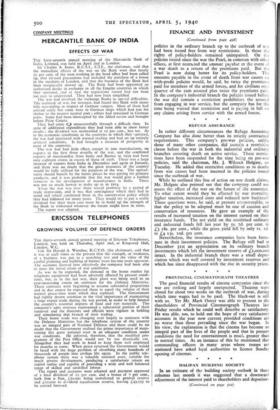ERICSSON TELEPHONES
GROWING VOLUME OF DEFENCE ORDERS THE thirty-seventh annual general meeting of Ericsson Telephones, Limited, was held on Thursday, April and, at Kingsway Hall, London, W.C.
Col. Sir Harold A. Wernher, K.C.V.O. (the chairman), said that it was at such times as the present that the strength, or weakness, of a business was put to a searching test and the value of the careful planning and building of former years became more apparent. The accounts showed how effectively the company had been able to meet the initial strain of war conditions.
As was to be expected, the demand in the home market for telephone equipment had been adversely affected by present condi- tions, but, as in the last war, their plant was being used to an ever-increasing extent on contracts for the Defence Ministries. Those contracts were beginning to assume substantial proportions and in due course he expected them to equal the volume of their normal peace-time work which they replaced. The Government had rightly drawn attention to the vital importance of maintaining a large export trade during the war period, in order to help finance the country's essential imports of food and raw materials. The company's sales overseas represented a substantial portion of their turnover and the directors and officials were vigilant in holding and stimulating that branch of their trading.
Their home trade was changing over largely to contracts with the Defence Ministries but the telephone system of the country was an integral part of National Defence and there could be no doubt that the Government realised the prime importance of main- taining this great national asset in an adequate condition under war conditions. He inferred, therefore, that the modified pro- gramme of the Post Office would not be too drastically cut. Altogether they had work in hand to keep them well employed for months to come. When peace returned the Government would be faced with the huge problem of absorbing many hundreds of thousands of people into civilian life again, In the public tele- phone system there was a valuable national asset, suitable for much greater development, producing a satisfactory return on capital outlay and capable of providing a wide and well balanced range of skilled and unskilled labour.
The report and accounts were adopted and payment approved of a final dividend of 12 per cent. and a bonus of 7 per cent., both free o ftax, £20,000 being transferred to general reserve and £zo,000 to dividend equalisation reserve, leaving £43,135 to be carried forward.














































 Previous page
Previous page